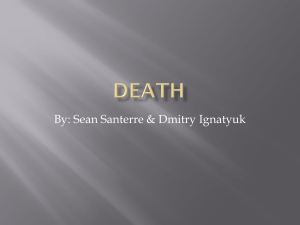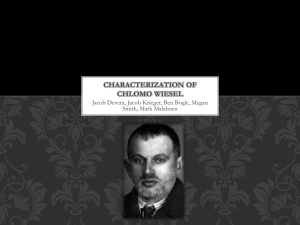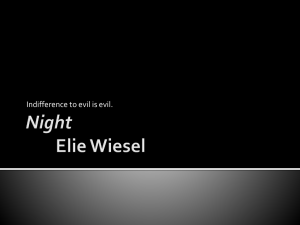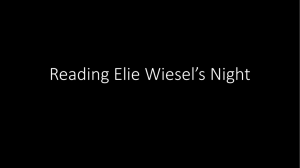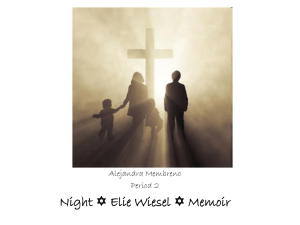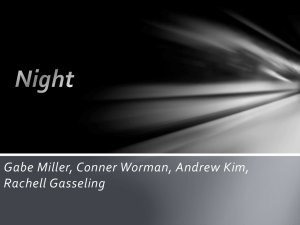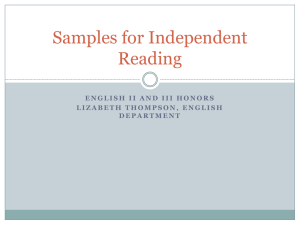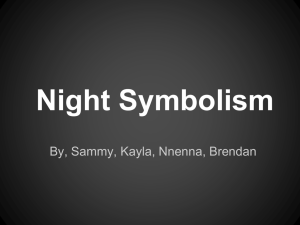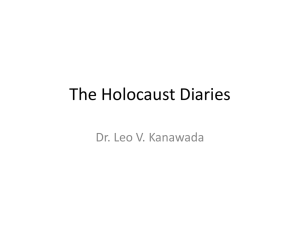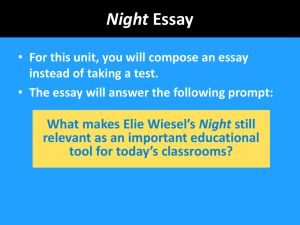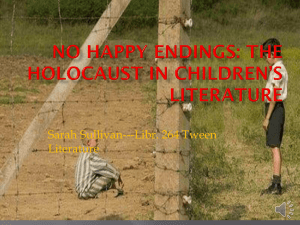File
advertisement
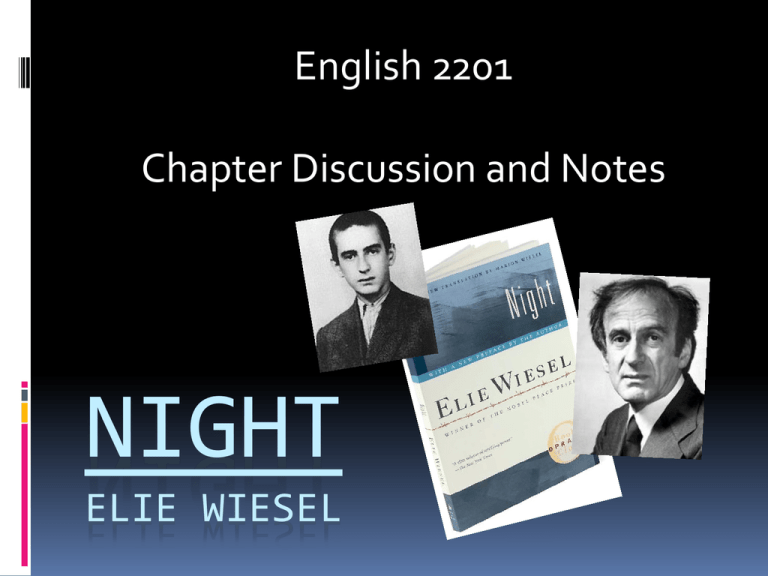
English 2201 Chapter Discussion and Notes NIGHT ELIE WIESEL Chapter 1 Pages 3-23 Elie Wiesel’s home in Sighet, Poland. Chapter 1 continued Setting: the time and place where a text takes place. *Often setting is an important aspect of a text. Sighet - a town in northern Romania near the meeting of the Hungarian and Ukrainian borders. Chapter 1 Focuses on Talmud – A sacred characterization of Elie, especially his strong sense of faith. “I was almost thirteen and deeply observant. By day I studied the Talmud and by night I would run to the synagogue to weep over the destruction of the Temple” p. 3 scripture in Judaism. Moishe the Beadle – Elie’s spiritual leader. - Highly regarded in the community. Moishe serves an important function in the novel’s beginning: Prophet of what is to come. (See pg. 6-7) Chapter 1 continued Elie’s Family: Mother and Father own a store Father’s description as “unsentimental” and caring for welfare of others over his kin – p. 4 Hilda – eldest, Bea, Elie, and Tzipora (youngest) Chapter 1 continued Moshie’s return is towards the end of 1942. Life still seems normal at this time 1943 – described as an encouraging year (p. 8) Elie is still studying Spring 1944 – good news from Russian front Elie, one of Moishe’s only believers, asked his father to liquidate and leave Things change – p. 9 Chapter 1 continued The rapidity of the onset of Nazi troops p. 9 Creation of ghetto’s p. 11 Laws against Jews p. 11 The yellow star p. 11 “Transports” – p. 13 P. 15 – preparing for the ‘journey’ The unknown future Chapter 1 continued “Our backyard looked like a marketplace” p. 15 Brutality - beating old women and men Commands, Orders “My father was crying” – p. 19 Transported to the ‘small ghetto’ p. 20 Mother’s faith – “we cannot give up” Mood, and Tone – p. 21 Chapter 1 continued Pg. 21-22 – last supper as family, which is somewhat similar to the last supper with Jesus and his disciples. Vivid description, use of figurative language abounds as Elie paints a picture of their expulsion on page 22. Cattle Car dexcription p . 22 Gestapo - was the official secret police of Nazi Germany Chapter 2 Pages 23-28 “The heat, the thrist, the stench, the lack of air, were suffocating us.” p. 26 Chapter 2 Loss of human dignity in the cattle cars Little food left Mrs. Schater – why is she important? “Fire, I see Fire” “She is mad, poor woman . . .” p. 25 “Work will set you free” Chapter 2 continued “In front of us, those flames. In the air, the smell of burning flesh. It must have been around midnight. We had arrived. In Birkenau.” p. 28 Chapter 3 Pages 29 - 46 “The beloved objects we had carried with us from place to place were now left behind in the wagon and, with them, finally, our illusions.” p. 29 Chapter 3 Chapter 3 begins, aptly, with Elie’s realization that both the physical reality and mental reality of the Holocaust had now set in for his family: “The beloved objects that we had carried with us from place to place were now left behind in the wagon and, with them, our illusions.” p. 29 What were the illusions? Chapter 3 Elie and his father are separated from his Mother, Tzipora, Hilda, and Bea. Why is it that Elie chooses to name Tzipora? Chapter 3 Elie and his father are told to change their age: 18(15) and 40(50) Elie explains that his family, even as of 1944, did not know the horrors of Auschwitz. Imagine if this happened today? Think of Twitter, Facebook. News did not travel so fast in that time. Now – news is instant. “We musn’t give up hope, even now as the sword hangs over our heads. So taught our sages . . .” p. 31 An emerging theme is that of Hope, which is the fuel that helps the Jews survive (those lucky enough to be spared). The horror of babies is contrasted with childhood – innocene At the onset, Elie is still very innocent Chapter 3 On page 33, Elie’s first anger towards his deity is expressed: “For the first time, I felt anger rising within me. Why should I sanctify His name? The Almighty, the eternal and terrible Master of the Universe, chose to be silent. What was there to thank Him for? What is your opinion? The feeling of death at your doorstep, every second, every minute, every hour, every day. Chapter 3 “Do you remember Mrs. Schachter, in the train?” Elie’s father, p. 34 Note passage on page 34. Use of parallelism: Parallelism means giving two or more parts of the sentences a similar form so as to give the whole a definite pattern. The degradation of Jews continues as they face life in the concentration camps. Chapter 3 Note Elie’s depiciton of how the Jews were numbed into a state of non-existence: “The absent no longer . . .” p. 36 On page 37 Elie reflects on his new state of mind: “I too had become a different person. The student of Talmud, the child I was, had been consumed by the flames. All that was left was a shape that resembled me. My soul has been invaded-and devoured-by a black flame.” p. 37 Chapter 3 Chapter 3 Elie and his father are marched to Auschwitz, having survived selection. Note the passage on pg. 41 Is this false hope? Or, is that glimmer hope part of the reason Elie survives? A-7713 – “I became A-7713” What’s in a name? Identity lost? What are the consequences? Chapter 3 What is the importance of meeting their relative Stein? Should Elie have lied? God’s test – pg. 45 – Akiba Drumer Arriving in Buna. At this point, what observations and or questions do you have? What themes come to mind? Chapter 4 Pages 47-65 The largest Auschwitz sub-camp, called Buna, was located here from 1942 to 1945. The Nazis sent thousands of prisoners from various countries, the majority of them Jewish, to Buna (there were approximately 10,000 prisoners in this camp in 1944). A significant proportion of them died because of arduous slave labor, starvation, savage mistreatment, and executions. Those who were unable to go on working fell victim to selection and were taken to their deaths in the Birkenau concentration camp gas chambers. Source: http://www.jewishvirtuallibrary.org/jsource/Holocaust/Buna.html Chapter 4 “The camp looked as though it had been through an epidemic: empty and dead.” p. 47 “Buna is a very good camp. One can hold one’s own here.” – Again, a sense of hope. Elie’s shoes – pg. 48: He wouldn’t give them up, because “they were all [he] had left.” However, he loses them for nothing in return. Does this not illustrate so much of what happens in the Holocaust. Chapter 4 Elie evades, luckily, the dentist who was extracting gold teeth p. 52 Life in the Buna camp seems to be going well Elie suffers the wrath of Idek – pg. 53 Isn’t the encounter with the young girl amazing? When Elie’s father is beaten by Idek, what does he feel? Chapter 4 Idek’s copulating results in a nasty episode of brutality for Elie The man who went for the soup – bravey or stupidity? Neccessity? The hanging of the young boy from Warsaw held a particular significane for Elie, despite all the horrors of the Holocaust he had witnessed. Why? “I remember that on that evening, the soup tasted better than ever . . .” p. 63 Chapter 4 Loss of emotion – “I never saw a single victim weep. These withered bodies had long forgotten the bitter taste of tears.” p. 63 “The little pipel – the sad-eyed angel” – note how Elie often describes victims as angels. “Where is merciful God, where is He?” “And from within me, I heard a voice answer: Where He is? This is where – hanging here from this gallows . . .” “That night, the soup tasted of corpses” p.65 Chapter 4 At this point in the novel, Elie has undergone several important characters changes: Elie’s faith has changed Elie’s feelings towards his father have changed Elie’s life is based on soup and bread, which equals survival He has, unfairly, come of age because of the horrors of the Holocaust GROUP ACTIVITY In Groups, Discuss the Following: Developing Themes in Night Conflicts in Night Symbolism in Night Elie’s use of Language Any questions that your group would like answered: I.E. An aspect of the novel that you do not understand. CHAPTER 5 Pages 66-84 “On the eve of Rosh Hashanah, the last day of that cursed year, the entire camp was agitated and every one of us felt the tension.” p. 66 Chapter 5 Chapter 5 begins on the eve of Rosh Hashanah, the last day of the Jewish year. Note how “last” is described by Elie: “The word “last” had an odd ring to it. What if it really were the last day?” p. 66 Again, Elie and the Jewish people lived each day as if it could be their last day. There is a feeling of irony in these words. Chapter 5 The passage which begins: “What are You, my God? I thought angrily. How do You compare to this stricken mass gathered to affirm to You their faith, their anger, their defiance? What does your grandeur mean, Master of the Universe, in the face of all this cowardice, this decay, and this misery? Why do you go on troubling these poor people’s wounded minds, their ailing bodies?” p. 66 What do you make of this passage? Is Elie still faithful? Is it important? How does it represent the theme of faith in this memoir? Chapter 5 The question of God’s presence is questioned again on pg. 67: Beginning with: “Why, but why would I bless Him?” “And I, the former mystic, was thinking: Yes, man is stronger, greater than God. When Adam and Eve deceived You, You chased them from paradise . . .” Elie uses several of God’s greatest challengers in this passage, why is it effective to state these ? Chapter 5 Elie’s faith is completely changed at this stage in the novel. He notes that Rosh Hashanah would normally have consumed him, but now he is accusing God for the misery of his people. “I was the accuser, God the accused.” p. 68 Elie and his father share ‘tears’ and he notes that never before did they understand each other so clearly. Chapter 5 Yom Kippur – a day of fasting We were fasting all year – “It was Yom Kippur every day of the year” Elie is tired of God’s silence. Another ‘selection’ is to take place p. 70-71 Dr. Mengle Chapter 5 The Bell is lamented by Elie: why? What does it represent? Pg. 73 Page 75 – Elie’s father is to stay behind for the final, decisive selection – he gives Elie a knife and spoon – what does this gift symbolize? This chapter really focuses the loss the Jewish prisoner’s faith, of God’s mercy. It’s Elie’s attempt to understand how God can stand by and watch his people suffer. Chapter 5 Elie’s foot swells and he placed in the infirmary The threat of selection is eminent. The Advance of the Red Army – but Elie is not encouraged by this ‘false hope.’ Note, this is a drastic change from earlier when they continuously believed in false hope. “I have more faith in Hitler than in anyone else. He alone has kept his promises, all his promises, to the Jewish people.” p. 81 Chapter 5 The irony in leaving the infirmary, when he would have been better to stay. Page 82 The camp is to be evacuated, another ‘journey’ for Elie and his father. Note: Buna is being evacuated. Points of Interest Theme Development: Conflict: Good vs. Evil Intrapersonal Survival Elie vs. himself/faith Faith on Trial External: Isolation Nazis vs. Jewish Silence Jewish vs. Nature Their struggle to survive against its harshness Points of Interest Motif - is any recurring element that has symbolic significance in a story. Through its repetition, a motif can help produce other narrative (or literary) aspects such as theme or mood. MOTIFS IN NIGHT: Night Fire Chimney Ashes Darkness Crematoria Kaddish God Symbolism in Night Night is a key symbol in the novel. It represents the darkness of the Holocaust, the evil of the Nazis, and the very dark place of isolation where all Jews find themselves. Fire, Crematoria, Chimney, Ashes: These images symbolize the burning of flesh, the evil of the Nazis, the persecution of the Jewish people. Chapter 6 Pages 85-97 “Faster, you filthy dogs!” pg. 85 Chapter 6 This chapter begins with a death march “The night was pitch black.” – p. 85 The use of night as a motif continues Elie has gone so far as to delineate a difference between himself and his body: “I couldn’t help thinking that there were two of us: my body and I. And I hated that body.” p. 85 Chapter 6 Elie begins to consider death as an option: “Death enveloped me, it suffocated me. It stuck to me like glue. I felt I could touch it. The idea of dying, of ceasing to be, began to fascinate me. To no longer exist.” p.86 However, Elie perseveres because of his father’s presence: The significance of Elie’s father is that his presence fueled his will to live. Chapter 6 “We were the masters of nature, the masters of the world. We had transcended everything-death, fatigue, our natural needs. We were stronger than cold and hunger, stronger than the guns and the desire to die, doomed and rootless, nothing but numbers, we were the only men on earth.” p. 87 Note the imagery used to describe the morning on page 87 Chapter 6 The death march ends – Elie lies in snow, which he describes as a “warm blanket” Rabbi Eliahu loses his son p. 91 Elie wonders if the son “wanted to be rid of his father?” Elie prays to God: “Oh God, Master of the Universe, give me the strength never to do what Rabbi Elihau’s son has done.” p. 91 Chapter 6 Elie and his father commence another march towards Gleiwitz p. 92 Elie reunites with Juliek – p. 93 Imagine digging out from a mass of dead, and half dead bodies – Survival. Listen to the beautiful description of Juliek playing violin on pg. 95 What does the word envelop mean? Another selection is imminent p. 96 They barely survive - thanks to Elie. Chapter 7 Pg. 98-103 Chapter 7 “The Night was growing longer, neverending.” Symbolically, this represents the neverending horror of the Holocaust. Elie’s father is near death The humiliation of the bread tossing and the reference to a similar anecdote in the future is significant. This illustrates the lasting effects of the Holocaust. Chapter 7 Meir Katz and his father struggle This chapter really focuses on the struggle for survival and the weight Elie’s father was putting on him. Elie was fighting two life battles. They arrive in Buchenwald.
